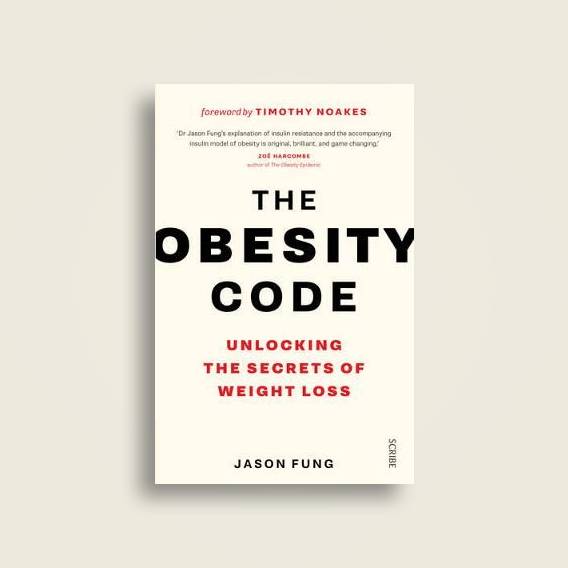Eat less, move more … And if all that was bullshit? or almost?
Hello, Young Padawan
Let’s put the cards on the table: If you are overweight, it is because at some point in your life you have eaten more than what your body needed to function normally. Until then, we all agree. And years after years, things get tough.
It gets tough because today after several diets, you are still overweight, chronic dieting and you think of food 24/7…
As I promised, we will talk about overweight in this article with a short summary of a book entitled “The obesity code”, based on hundreds of scientific studies (32 pages of bibliography in this book, who says better?!), written by Dr. Jason Fung. Despite its recent publication (2016), this book is today a reference in the medical world with its vision in the area of overweight and obesity.
It seemed useful to me to share it here in my little reading section, because it gave me a lot of answers, and I think it could help you too, if only once in your life you wanted to lose some fat, or if you do not want to disrupt your body with crappy behaviors in the future. Yep, that’s nice too.
The body is a machine much more complex than we think. As mentioned earlier in this blog, we saw that our intestines (coming soon in English) and that our liver (coming soon in English) were essential keys to our balance, we also saw that the anti-inflammatory diet was crucial, especially if we want to avoid cancer-type diseases (coming soon in English), and that the glycemic index is essential to our balance … yes but how far? Spoiler alert: more than you think. Our blood sugar can take us to paradise and beyond of well-being and health, or just beyond if you know what I mean (I know you like my rotten humor, ed).
Enough digressions, and let’s return to our subject: overweight, its causes and consequences …
The calorie deception (part 2 of the book)
As we said, if we are overweight it is because we ate more than our bodily needs. Strong of this observation, it is assumed that it would be enough to eat less and possibly move more to restore the balance, as they say everywhere. However, thinking this way, we consider that our metabolism will remain fixed whatever we eat or do as an activity.
But it does not work. As soon as we stop the caloric restriction diet, after the stabilization period, we gain weight again in the following years. After 7 years, 95% of patients who have dieted regain the lost weight, all of it, part, or sometimes even a bonus. To seek to restrict ourselves to the caloric level leads us inexorably to the yo-yo effect, to lose control.
Here we are, we do not control everything, nor our heart rate, neither our breathing for example … nor the amount of fat that is in our body, neither what we put in our stomach…
I can hear you cringe behind your screen if you are thin and you’ve never had (a real) concern for weight. We must realize that it is not because there is a part of the mechanism that is aware, that we have control over all of it.
When one is overweight, one has generally experienced several restrictive diets and the body is now disordered.
We start our day thinking about food, every hour, every minute becomes an obsession, a nightmare of what we can eat or not and we rot our mind with all those haunting voices that judge us so severely, so at the end of the day, when the brain has looped all day long, we fall into Oreos. The will has its limits when the mental obsession puts it to the test 24/7. And this part, mental obsession, is hormonal. It’s the hormones that control our weight, not our will. And that we cannot control it. Or almost not.
Hormones regulate us, the will has its limits (part 5 of the book: What’s wrong with our diet?)
Sugar is an addictive drug just like cigarettes, alcohol or cocaine. It is a powerful endocrine disruptor that disrupts our insulin production and leads to serious diseases.
After eating, blood glucose rises, insulin helps to transport the sugar into the cells and once they are full, they will take it to storage areas such as the liver (as glycogen stores) and muscles. Once they are also full, we make fat and gain weight. The main hormone that regulates this process is insulin.
Indeed: Two diseases whose main symptom is overweight and underweight is type I diabetes and type II diabetes.
Type I: Pancreas that does not produce enough insulin. Since it does not have enough insulin, the organism can’t stock because there is not enough insulin to carry the sugar. That’s why there is an insulin prescription: to carry the sugar in the cells. Hence the thinness because the patient cannot store.
Type II: Glycemia so high that the body produces insulin all the time and spends its time storing. The pancreas eventually gets tired because it can not produce enough insulin. Insulin is prescribed to patients because if you have too much sugar in your blood, you die. And unfortunately, patients who take insulin take even more weight.
In theory, if there is enough fat in the body, the cells will produce leptin in order to send the message to the brain to reduce hunger sensations. So we are supposed to be less hungry when we have enough fat in the body.
However, leptin is inhibited by the presence of insulin in the blood. So if we constantly have insulin or too much blood sugar, the cells will not be able to report it to the brain. This is what happens to many of us.
Why diets do not work
Most calories restricted diets tell us to eat less but more often, in 3,4,5 or even 6 mini meals, snacks, again and so on.
Not only will leptin not be able to do its job and will not be able to report to the brain, so we will be hungry all the time, but in addition, we cannot destock efficiently if we produce insulin permanently.
You cannot destock until you have insulin in your blood.
So, the body lowers its metabolism and adapts to the number of calories that you impose on it. You start to get cold, be in a bad mood, tired … because your metabolism goes down.
Small aside: Sweeteners are also responsible for obesity, because when we perceive on our tongue a “sweet taste”, the brain triggers the production of insulin, whether it is real or fake sugar. So we promote storage and therefore weight gain.
The solution (part 6 of the book)
Now you know, overweight and obesity are not due to a caloric imbalance but to a hormonal one (although it is the input-output caloric imbalance that caused the hormonal imbalance), because it is insulin which makes you store your fat. To lose weight Dr. Fung’s answer is clear, it is insulin that should be considered first. If we eat too often (3 meals a day and too many snacks… and too rich), we produce too much insulin to be able to destock fat.
– Intermittent fasting.
Indeed, by having fewer meals a day, insulin will go down and we will be able to access destocking and recalibrate our (which is supposed to be our) natural weight, regulated by our hormones, and finally let our body regulate us naturally.
In the beginning, necessarily, if you eat (as much but) less often you will be hungry (call of sugar), but after a few days the body will regulate itself and the real hunger (not the call of sugar) will appear, and the body will regulate itself. For this natural process to re-establish itself (leptin), it will be necessary to appeal to our pure will. It can take between 15 days and 3 weeks. Between 15 days and 3 weeks to be released from this mental fatigue, this daily obsession #freeliketheriver.
For example, eating on the hour range 12 am-20 pm (or 1 pm-9 pm) with a meal at noon and another in the evening. Indeed, skipping the breakfast and snacks allows the liver to empty its glycogen stocks and release fat because you will thus observe a fast from 9 pm to 1 pm (or 8 pm-12 am).
This is to be validated with your doctor of course, but again, at the risk of repeating myself, even diabetics and stage 4 cancer patients in Germany are treated with intermittent fasting between 2 chemos with very positive results … so I doubt that your Doc will tell you to stay overweight. #sarcasticshortcut.
– Avoid non-natural sugars, industrial products, and focus on low GI foods.
For this one I’ll probably repeat myself again (I’m aging, you see?!, ed), you have probably (or not) read my article on the anti-inflammatory diet (everything is related, Young Padawan, everything is related), as well as the one on blood sugar (for the low GI in particular).
In case of “or not”, know that our diet has changed much more in 70 years than in 3 million years. Which means that your Homo sapiens-sapiens’ guts are not made to digest all these (shitty) industrial products. And especially refined sugars and else (glucose syrups, …).
Conversely, fruits, for example, bring plenty of vitamins, minerals, and fiber in addition to sugars …
– Some type of sport increases your basic metabolism, such as strength training.
The basic metabolism is the number of calories you spend at rest. And the more you have muscles, the more calories you spend watching Games of Thrones on your couch (I’ve never watched a single episode. Is it serious, doctor? Do I really miss somethin’?). For example, take two men of the same size and weight. One is muscular, the other is not. One can spend 300 or even 500 kcal more per day than his friend while both are slumped on the couch like dead turkeys. I’ll let you guess which one.
It is therefore important to gain muscle mass when you want to lose or maintain your weight.
And if you are a girl no worries, before you look like Stallone (with a blond wig) you will have to push weights that even by squeezing your ass and pushing worse than for the delivery of your triplets you will never get them to move. And to be doped, incidentally.
So go ahead, push those bars Brenda, you will not have the shoulders of a truck driver …
I hope I have convinced you to read this book. Here is my affiliate link but no obligation to buy it through this, it goes without saying (so I say it anyway. Yes you know … verbena power of the old lady that I can be sometimes, with my old words and puns).
I test the intermittent fasting for quite some time now, and I saw very positive results on my body and much more than in terms of weight: sports recovery, recovery after surgery, I have almost no jet lag when I go from the USA to France or vice versa, less fatigue, more energy, more concentration, I’m still waiting a little before to write an article about it more precisely.
Healthy Kisses! 🍋
Sources: The obesity code, Dr. Jason Fung, ed. Scribe. As well as some studies taken in the author’s bibliography.

The Dequindre Cut, Detroit, Michigan, USA.

